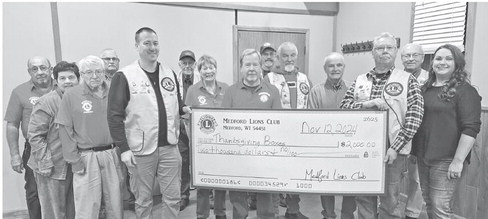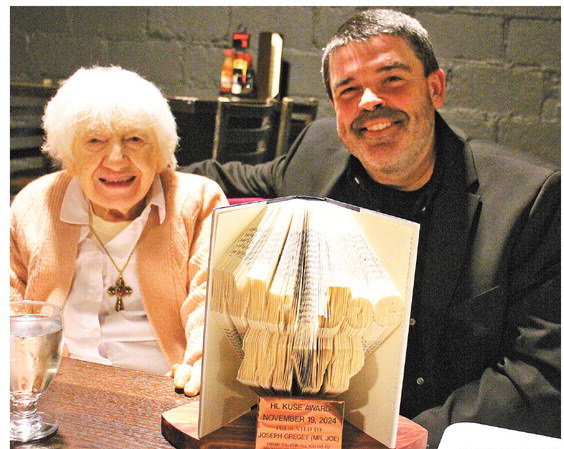Always something to be thankful for


This week’s issue finds us on the eve of Thanksgiving, a chance to pause and reflect on all of life’s blessings, big and small. Gratitude is a great antidote to worry and changes the way we view the world around us.
Although we know gratitude is important, sometimes it can be hard to maintain an attitude of gratitude. Life is tough and there are plenty of things ready to drag us down, be it negative news globally, nationally or locally; grief or loss; mental, physical or financial challenges for ourselves or someone we love; or even personal struggles standing in the way of our own success.
With all these factors clouding our vision, sometimes a change in perspective is helpful. For that, I looked to some public figures who have gone through significant adversity in their lives and yet maintained a deep sense of underlying gratitude. If they can find a way to choose gratitude in the midst of everything, surely we can too.
One such person is internationally acclaimed speaker Nick Vujicic. Born in 1982 without arms or legs, Vujicic faced significant struggles from the very beginning. His parents moved to Australia from a refugee camp before he was born and didn’t have many resources. Unsurprisingly, Vujicic was bullied at school. At age 10, he tried to commit suicide by drowning himself in a bathtub.
However, out of the deep lows he went through came a tenacity and determination to reframe obstacles as opportunities. Vujicic’s dad always told him that although he didn’t have arms and legs, he had a brain and he ought to use that brain to hire employees so they could be his arms and legs for him. Vujicic worked hard to become a successful investor and entrepreneur, overseeing about 18 employees over three different organizations. He became a motivational speaker, having traveled to 78 countries, presenting on 3,500 stages, to crowds as large as 800,000 people. He also developed an Attitude Is Altitude social and emotional learning curriculum for schools, published his own book and more.
In an interview with Benjamin Ang of Asia Advisers Network, Vujicic was asked how he has been able to practice resilience and perserverance.
“I think (maintaining) an attitude of gratitude, not only the things you have, but the things that could have gone even worse,” he said.
“If you don’t see your life as a gift and you take it for granted, I think you’ve missed out on the secret of life. The happiest people that I’ve ever met are the ones who intentionally live a lifestyle of gratitude. Because if you’re always living in the future, you have never lived,” he concluded.
Another example of someone choosing not to let an extreme trauma define them is a man named Spencer Beach of Alberta, Canada. He joined the family business of installing floors after high school. One day in 2003, when he was just 29 years old, he was using powerful chemicals to remove vinyl flooring from a brand-new home. A sudden explosion and flash fire left him with thirdand fourth-degree burns on over 90 percent of his body. He was given a 5 percent chance of survival.
In the hospital, he was put in a medicallyinduced coma for six weeks. By the time he woke up from it, he weighed just 112 pounds. He ended up spending 14 months in the hospital and endured five years of recovery and 39 surgeries over the next 16 years. He had a turning point when he first held his infant daughter in his arms five months after the fire.
“I stopped looking inside and started looking outside and seeing things worth fighting for,” he told Julie Wietzke of Forward in Christ magazine.
Making his way through suicidal thoughts, depression and anger, Beach found purpose and went on to become a successful speaker, starting by speaking on workplace safety. He now gives more than 100 safety and motivational presentations each year.
He looks for the blessings in each day, and finds them.
“If God can take a guy whose quality of life should have been so poor that he should have not been given a choice to live and work me into the person I have become now, how can you not see the grace and love of God?” he told Wietzke. “How can I ever say that this was not a blessing?
“Although there’s nothing wrong with being a floor layer, my life is way more better than it was. I have way more purpose and meaning and passion and inspiration and gifts. It’s just brighter.”
I’ll end with some words from Patrick Henry Hughes. He born with a rare genetic disorder that left him without eyes and unable to fully straighten his arms and legs, leaving him unable to walk. He also had two steel rods attached to his spine to correct scoliosis. Despite his physical challenges, he has gone on to achieve great success as a talented musician, student, performer and public speaker. He began playing the piano when he was 9 months old, and also sings and plays the trumpet. He has performed at the Grand Ole Opry and the Kennedy Center, and has recorded two CDs. He graduated from the University of Louisiana magna cum laude and speaks Spanish fluently. He even marched with the U of L marching band for five seasons, his father pushing his wheelchair through all of the formations. The story of how that came to be is told in the movie “I Am Potential,” worth the watch.
Hughes has never focused on his disabilities, but instead chosen to focus on his abilities.
“I mean, God made me blind and didn’t give me the ability to walk. I mean, big deal.” Patrick said in an interview with ABC News. “He gave me the talent to play piano and trumpet and all that good stuff.”
Hughes also wrote the book, “I Am Potential: Eight Lessons on Living, Loving, and Reaching Your Dreams” with his father and Bryant Stamford.
“I hope that those who read my book realize that life is beautiful if only you count your blessings and realize all the great things you have in life instead of looking at what everyone else has,” said Hughes.
Striking a
Chord...


